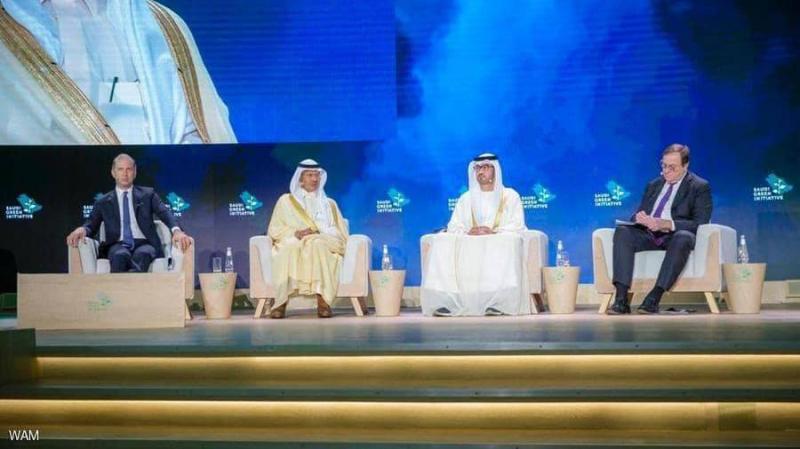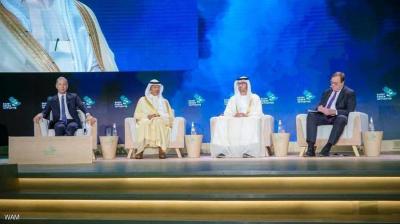On Saturday, the United Arab Emirates expressed its admiration for the Kingdom of Saudi Arabia's announcement of its aspiration to achieve net zero by 2060. The UAE praised the vision of its leadership, government, and people in this ambitious and constructive step, and commended the holding of the "Saudi Green Initiative Forum" and the kingdom's efforts to find practical solutions to address the impacts of climate change.
During the main opening session, a discussion panel titled "Countdown to the COP26 Conference: The Current Situation Before a Crucial Summit" was held as part of the one-day forum program in the Saudi capital, Riyadh. Sultan Ahmed Al Jaber, Minister of Industry and Advanced Technology and the UAE's Special Envoy for Climate Change, stated: "We congratulate our brotherly Kingdom of Saudi Arabia, its leadership, government, and people on announcing the strategic net zero initiative. This initiative represents a qualitative leap in efforts to confront the impacts of climate change and emphasizes the vital role our region can play in finding practical solutions in this field."
Alongside Prince Abdulaziz bin Salman Al Saud, Saudi Minister of Energy, Sultan Al Jaber participated in the discussion along with Marco Alvera, CEO of the Italian Snam gas networks company, and Patricia Espinosa, Executive Secretary of the United Nations Framework Convention on Climate Change.
Sultan Al Jaber clarified that "under the guidance of the wise leadership of the UAE, we welcome the steps taken by the Kingdom in the field of climate action, and we are ready to coordinate and work together to achieve the goals of our brotherly countries and our region." He emphasized the important role of oil and gas in meeting energy needs currently and during the energy transition, stressing the importance of a realistic, pragmatic, and flexible view of the energy future.
He pointed out that the UAE's strategy to reach climate neutrality by 2050 aligns with the vision of the UAE leadership and the economic and social growth plans, embodying realism, flexibility, and practicality. He underscored the necessity of designing climate solutions in a flexible manner that fits the needs of different countries based on their specific characteristics and circumstances, and that a one-size-fits-all model should not be imposed. He asserted that climate action should be an opportunity for sustainable economic and social development for everyone.
He noted: "Our region is characterized by harsh climatic conditions, and we must continue to innovate and work to adapt to these circumstances. I am confident that a comprehensive partnership-based approach that sees the energy transition as an economic opportunity is the best way to achieve sustainable global progress. Our strategic initiatives to reach climate neutrality by 2050 are an open invitation from the UAE to the world to join us in developing a new economic model for sustainable growth and progress."
He added, "By following this approach, the world can seize the opportunity of the energy transition and invest in low-carbon solutions to achieve economic prosperity for all. To realize this, developing countries must receive the financing and technical support they need to transform their energy systems and take necessary measures to mitigate the impacts of climate change."
He explained: "We need to activate Article 6 of the Paris Climate Agreement to establish carbon markets that help direct capital toward low-carbon solutions." He further stated, "The world urgently needs to adopt an inclusive and flexible approach that allows each country to chart its own path toward reducing carbon emissions."
He highlighted that these are some of the reasons the UAE looks forward to hosting COP28. He noted that the UAE seeks to work with COP26, COP27, and COP28 and with the secretariat of the UNFCCC, indicating that progress in these conferences will depend on a comprehensive approach that brings together all sectors: public, private, academic, and civil society. This approach should also include "countries with significant hydrocarbon resources due to their pivotal role in the energy transition."
In response to a question from Fred Kemp, President and CEO of the Atlantic Council and moderator of the session, regarding the strategic initiative to achieve climate neutrality in the UAE by 2050, Sultan Al Jaber explained that the strategic goal of this initiative aligns with the development path the UAE is embarking on to diversify its economy. He said: "The strategic initiative to achieve climate neutrality in the UAE by 2050 is an economic program that aligns with our wise leadership's developmental vision for the UAE for the next fifty years. We believe that striving for climate neutrality stimulates economic opportunities and serves as a means to invest in these opportunities to acquire knowledge, develop new industries, and create jobs in future sectors."
He added: "Therefore, the UAE was one of the first countries to initiate capacity building in renewable energy and today operates three of the largest and lowest-cost solar power plants in the world. The UAE will focus on collaborating with countries in the region and the world to invest in these opportunities to increase the country's renewable energy capacity fourfold to approximately 9 gigawatts by the end of 2025."
He revealed: "Hydrocarbon resources currently account for over 80% of the global energy system, with oil and gas specifically representing about 55% of these resources. The important role of oil and gas will continue to meet the world's energy needs for decades to come. Currently, renewable energy sources only meet 7% of global energy demand, indicating that we need more time for renewable sources to meet a greater share of the world's energy needs."
Regarding the current situation of energy supplies, he stated that the supply shortage is due to a slowdown in long-term investment in conventional fuels and called for continued and enhanced investments in this field, noting that investment in oil and gas has decreased by 15-20% since 2014, with a decline of a third last year compared to 2019 despite rising demand to about 100 million barrels per day.
He added: "In the absence of sustained investments in conventional fuels, the world may face significant supply fluctuations during unexpected disruptions, such as health pandemics and others. Therefore, countries must increase investments and take necessary actions to ensure energy security and economic prosperity."
It is worth mentioning that the Saudi Green Initiative aims to enhance the quality of life and protect future generations in Saudi Arabia. The initiative combines environmental protection with significant transformations in the energy sector and sustainability programs to achieve three overarching goals aimed at building a sustainable future for all: reducing carbon emissions, planting trees throughout Saudi Arabia, and protecting terrestrial and marine areas.




